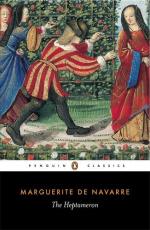She was sought in marriage by or offered in marriage to divers distinguished persons during her widowhood, and this was also the time of her principal diplomatic exercise, an office for which—odd as it now seems for a woman—she had, like her mother, like her niece Catherine of Medicis, like her namesake Margaret of Parma, and like other ladies of the age, a very considerable aptitude and reputation. When she at last married, the match was not a brilliant one, though it proved, contrary to immediate probability, to be the source of the last and the most glorious branch of the royal dynasty of France. The bridegroom bore indeed the title of King of Navarre and possessed Beam, but his kingdom had long been in Spanish hands, and but for his wife’s dowry of Alencon and appanage of Berry (to which Francis had added Armagnac and a large pension) he would have been but a lackland. Furthermore, he was eleven years younger than herself, and it is at least insinuated that the affection, if there was any, was chiefly on her side. At any rate, this earlier Henry of Navarre seems to have had not a few of the characteristics of his grandson, together with a violence and brutality which, to do the Vert Galant justice, formed no part of his character. The only son of the marriage died young, and a girl, Jane d’Albret, mother of the great Bourbon race of the next two centuries, was taken away from her parents by “reasons of state” for a time. The domestic life of Margaret, however, concerns us but little, except in one way. Her husband disliked administration, and she was the principal ruler in their rather extensive estates or dominions. Moreover, she was able at her quasi-Court to extend the literary coteries which she had already begun to form at Paris. The patronage to men of letters for which her brother is famous was certainly more due to her than to himself; and to her also was due




